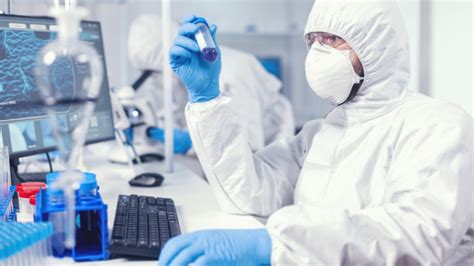Nuclear Pharmacy Careers

The field of nuclear pharmacy is an intriguing and specialized niche within the broader domain of pharmacy, offering unique opportunities for professionals who are passionate about nuclear medicine and its applications. Nuclear pharmacy careers are not only rewarding but also play a critical role in the healthcare system, ensuring the safe and effective use of radiopharmaceuticals in diagnosis and treatment.
This article aims to delve deep into the world of nuclear pharmacy, exploring the educational path, skills required, career prospects, and the impact these professionals have on patient care. By the end of this comprehensive guide, you'll have a clear understanding of what it takes to forge a successful career in nuclear pharmacy and the opportunities that await.
Understanding Nuclear Pharmacy

Nuclear pharmacy is a highly specialized branch of pharmacy that focuses on the preparation, compounding, and dispensing of radiopharmaceuticals. These substances are used in diagnostic imaging and therapeutic procedures, offering a non-invasive and highly effective approach to understanding and treating various medical conditions.
Radiopharmaceuticals are unique in that they combine a radioactive isotope with a pharmaceutical compound, enabling the production of images that provide valuable insights into the body's internal structures and functions. This technology has revolutionized modern medicine, aiding in the early detection and treatment of diseases like cancer, cardiovascular disorders, and neurological conditions.
The role of a nuclear pharmacist is critical in ensuring the safety and efficacy of these substances. They must have a deep understanding of radiation physics, chemistry, and biology to ensure the proper handling, compounding, and administration of radiopharmaceuticals. Additionally, they play a vital role in patient education, ensuring that individuals undergoing nuclear medicine procedures understand the benefits and potential risks associated with radiopharmaceuticals.
Educational Requirements for Nuclear Pharmacy

The path to becoming a nuclear pharmacist is rigorous and requires a strong educational foundation. Here's a breakdown of the typical educational journey:
Pharmacy School
The first step is to obtain a Doctor of Pharmacy (PharmD) degree from an accredited pharmacy school. This typically takes four years of rigorous study, covering a broad range of pharmaceutical sciences. Students will delve into topics such as pharmacology, pharmacokinetics, pharmaceutics, and clinical pharmacy. Additionally, they will gain hands-on experience through rotations in various pharmacy settings, including hospitals, community pharmacies, and specialized clinics.
During pharmacy school, students can also opt to take elective courses or pursue a specialization in nuclear pharmacy. This allows them to gain a deeper understanding of the unique challenges and opportunities in this field.
Nuclear Pharmacy Residency
While not always mandatory, completing a nuclear pharmacy residency can significantly enhance one's career prospects and skill set. These residencies typically last for one year and provide intensive training in all aspects of nuclear pharmacy practice. Residents work closely with experienced nuclear pharmacists, gaining hands-on experience in radiopharmacy operations, patient care, and research.
During a residency, residents might also have the opportunity to specialize further, focusing on specific areas like positron emission tomography (PET) imaging or radiopharmaceutical production. This specialized training can make them highly attractive candidates for future employers.
Certification
To practice as a nuclear pharmacist, one must obtain certification from the Board of Pharmacy Specialties (BPS). The BPS offers the Certified Nuclear Pharmacist (CNP) credential, which is a nationally recognized mark of excellence in the field. To earn this certification, candidates must pass a rigorous exam that covers all aspects of nuclear pharmacy practice, including radiopharmaceutical preparation, quality control, patient safety, and legal and ethical considerations.
Maintaining the CNP certification requires continuing education, ensuring that nuclear pharmacists stay up-to-date with the latest advancements and best practices in their field.
Skills and Attributes for Nuclear Pharmacy Professionals
In addition to the necessary academic qualifications, several skills and attributes are essential for success in a nuclear pharmacy career:
- Attention to Detail: Nuclear pharmacy is an incredibly precise field. A slight deviation in the preparation of a radiopharmaceutical can have significant consequences. Thus, nuclear pharmacists must possess exceptional attention to detail to ensure patient safety and the efficacy of treatments.
- Critical Thinking and Problem-Solving: Nuclear pharmacists often face complex challenges, from ensuring the stability of radiopharmaceuticals to troubleshooting issues with imaging equipment. Strong critical thinking skills are vital for effective problem-solving and decision-making.
- Communication and Collaboration: Effective communication is key in nuclear pharmacy. Pharmacists must collaborate closely with other healthcare professionals, including radiologists, technicians, and physicians, to ensure seamless patient care. Clear and concise communication is essential for explaining complex procedures to patients and their families.
- Time Management and Organization: The work of a nuclear pharmacist is often fast-paced and time-sensitive. They must manage their time efficiently, ensuring that radiopharmaceuticals are prepared and administered within strict timeframes. Strong organizational skills are crucial for maintaining accurate records and managing multiple tasks simultaneously.
- Adaptability: The field of nuclear pharmacy is constantly evolving, with new radiopharmaceuticals and technologies emerging regularly. Nuclear pharmacists must be adaptable, willing to learn and embrace new practices, and stay updated with the latest advancements in their field.
Career Opportunities in Nuclear Pharmacy
Nuclear pharmacy offers a range of exciting career paths, each with its own unique challenges and rewards. Here are some of the most common career opportunities:
Nuclear Pharmacy Technician
Nuclear pharmacy technicians work under the supervision of licensed nuclear pharmacists. They assist in the preparation of radiopharmaceuticals, ensuring that all procedures are followed accurately and safely. They also maintain inventory, handle quality control measures, and may interact with patients, providing information and instructions related to their nuclear medicine procedures.
Nuclear Pharmacist in a Hospital Setting
Nuclear pharmacists working in hospitals are integral members of the healthcare team. They collaborate closely with physicians, radiologists, and other healthcare professionals to ensure the safe and effective use of radiopharmaceuticals in diagnostic and therapeutic procedures. Their work involves preparing and dispensing radiopharmaceuticals, conducting quality control tests, and providing patient education.
Research and Development in Nuclear Pharmacy
For those with a passion for research, the field of nuclear pharmacy offers numerous opportunities. Researchers in this field work to develop new radiopharmaceuticals, improve existing ones, and explore innovative applications of nuclear medicine. They may work in academic institutions, pharmaceutical companies, or government research facilities, contributing to the advancement of nuclear medicine and its potential therapeutic applications.
Consultant Nuclear Pharmacist
Consultant nuclear pharmacists provide expert advice and support to healthcare facilities, pharmaceutical companies, and government agencies. They may be involved in developing policies and guidelines for the safe use of radiopharmaceuticals, conducting audits and inspections, or providing training and education to healthcare professionals.
Nuclear Pharmacy Education and Training
Some nuclear pharmacists choose to focus on education and training, sharing their expertise with the next generation of pharmacists. They may work in academic institutions, teaching and mentoring students, or develop training programs for healthcare professionals to ensure they have the necessary skills and knowledge to work with radiopharmaceuticals safely and effectively.
The Impact of Nuclear Pharmacy on Patient Care

Nuclear pharmacy has a profound impact on patient care, revolutionizing the way medical conditions are diagnosed and treated. Radiopharmaceuticals provide a unique and non-invasive way to visualize and understand the body's internal structures and functions, aiding in the early detection and treatment of various diseases.
For instance, in cancer treatment, nuclear medicine procedures can help pinpoint the exact location and extent of tumors, guiding surgeons and oncologists in their treatment plans. In cardiovascular disorders, nuclear imaging can provide detailed information about blood flow and heart function, aiding in the diagnosis and management of conditions like heart disease and arrhythmias.
Furthermore, nuclear pharmacy plays a critical role in personalized medicine. By using radiopharmaceuticals to understand an individual's unique physiological responses, healthcare providers can tailor treatments to each patient's specific needs, optimizing outcomes and minimizing side effects.
Challenges and Future Prospects in Nuclear Pharmacy
While nuclear pharmacy offers numerous opportunities and benefits, it also comes with its own set of challenges. One of the primary challenges is ensuring the safe handling and disposal of radioactive materials. Nuclear pharmacists must adhere to strict safety protocols and regulations to protect themselves, their colleagues, and the environment.
Another challenge lies in keeping up with the rapid advancements in nuclear medicine technology. As new radiopharmaceuticals and imaging techniques emerge, nuclear pharmacists must stay informed and adapt their practices accordingly. This requires a commitment to lifelong learning and a willingness to embrace change.
However, the future of nuclear pharmacy looks promising. With ongoing research and development, we can expect to see even more innovative applications of radiopharmaceuticals, further improving diagnostic accuracy and treatment outcomes. The field is also likely to expand its reach, with more healthcare facilities incorporating nuclear medicine into their diagnostic and therapeutic arsenal.
Additionally, as the world moves towards precision medicine, the role of nuclear pharmacy is set to become even more critical. By providing detailed insights into an individual's physiology and disease progression, nuclear medicine will play a pivotal role in tailoring treatments to each patient's unique needs.
Conclusion
Nuclear pharmacy is a highly specialized and rewarding field, offering professionals the opportunity to make a significant impact on patient care. With a unique combination of pharmaceutical knowledge and expertise in nuclear medicine, nuclear pharmacists play a critical role in the healthcare system.
The educational path to becoming a nuclear pharmacist is rigorous but rewarding, leading to a career filled with challenges and opportunities. Whether working in a hospital setting, contributing to research and development, or providing consulting services, nuclear pharmacists have a wide range of career paths to choose from.
As the field continues to evolve and advance, the role of nuclear pharmacy in healthcare is set to become even more prominent. With ongoing research and development, we can expect to see further innovations in nuclear medicine, enhancing our ability to diagnose and treat a wide range of medical conditions.
What is the average salary for a nuclear pharmacist?
+The salary of a nuclear pharmacist can vary based on several factors, including experience, location, and the type of employer. On average, nuclear pharmacists can expect to earn a competitive salary, with the median annual wage ranging from 120,000 to 150,000. However, salaries can exceed $200,000 for those with advanced certifications and specialized skills.
Are there opportunities for career advancement in nuclear pharmacy?
+Absolutely! Nuclear pharmacy offers numerous opportunities for career advancement. With experience and further education, nuclear pharmacists can move into leadership roles, such as nuclear pharmacy managers or directors. They can also specialize in areas like research, education, or consulting, opening up new avenues for professional growth and higher earnings.
How does nuclear pharmacy contribute to patient safety?
+Nuclear pharmacy plays a crucial role in ensuring patient safety. Nuclear pharmacists are responsible for preparing and dispensing radiopharmaceuticals, which must be done accurately and safely. They also provide education to patients and healthcare professionals, ensuring that everyone involved understands the potential risks and benefits of nuclear medicine procedures. By adhering to strict safety protocols and regulations, nuclear pharmacists help minimize the risks associated with radioactive materials.



